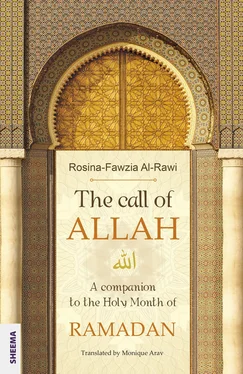Remorse is also an inner transformation of one’s attitude. It is to change the ego’s cry, “What is God doing to me!” to the call of the soul, “What is God doing through me!”
It is this deep confession that without Allah’s mercy and compassion, we are weak and bereft of all capability “for man has been created weak ” (4:28); this deep realisation opens our hearts to Allah and we become receptive to His mercy.
Tawba is like purifying water, which is why its most beautiful expression is tears that wash away all mistakes.
A Sufi by the name of Samad once said, “Although I regret my mistake, I feel elevated because my limitations have enabled me to experience the incredible beauty of Your forgiveness.”
Indeed, the Sufis say that the most essential qualities of the Divine nature are mercy and compassion. Were there no errors, mistakes or sins, that which matters most for Reality, namely Allah’s mercy, raḥma, would have no field in which to express itself.
In the Qur’an, life is described as a test. Endless processes give us the possibility to overcome the limitations of our ego, to dive into our true being and to connect with Allah’s compassion, wisdom and love.
Allah constantly moves us between His majesty and His beauty: “and the latter We tried with blessings as well as with afflictions, so that they might mend their ways.” (7:168)
If we remain stuck only in the material world, if we give free rein to our moods, our illusions, our desires and our will, we will not be able to find peace.
Remorse is to make space in our hearts for God’s will. This process takes us away from self-pity and from the role of victim to which our wounded self tries to pull us, time and time again, and it leads us to a sincere bond with Allah. It is the path towards both deep trust and responsibility.
HERE I STAND, O ALLAH,
ARMED WITH ALL THE ABILITIES YOU GAVE ME TO FIND YOU.
OPEN MY HEART SO THAT I MAY EXPERIENCE YOUR GUIDANCE
AND YOUR LOVE WHICH NEVER FAILS TO TOUCH ME.
HELP ME SERVE YOU AND STAY AWAY FROM DISOBEYING YOU.
NONE BUT YOU DO I BESEECH.
It is human to make mistakes, to sin. What matters is that we do not persist in them and pass them off as convictions, be it in our own eyes or in others’.
Ramadan is the month of blessings and absolute mercy, the month of forgiveness and the month of rueful return to God.
So often do we turn away from Allah, so often do we, in our complacency and our distraction, forget the deep meaning of our existence, and argue with our fate when we fail to get what we wish for and what we picture for ourselves.
When does God forgive us if not during the gracious month of Ramadan? For good deeds are accepted in Ramadan and bad deeds pardoned.
Tawba is to set out for God and discover the blessing which He has placed in you – for you and for all of creation. Find your blessing and offer it as a gift in the name of Allah.
PRACTICE SUGGESTED FOR TODAY
The Divine Name At-Tawwāb is the One who accepts repentance, the One who leads to the return. This Divine Name helps you to forgive.
When you are capable of forgiveness, when you can forgive those who have upset or hurt you, at least partly, or when you can forgive yourself, you can feel the quality of this Divine Name in you.
Admit when you have been unjust, resolve not to do it again, use your bad conscience to strengthen your intention not to repeat the mistake or injustice, and seek inner purity by trying to make up for it. Put it in God’s hands.
In this way, you will be able to forgive both your own and your fellow human beings’ carelessness. On the outside, act so as not to forget that which you have regretted and thus not to repeat it, whilst remaining free of all reproaches on the inside!
Whenever you have allowed yourself to become too distracted by your hunger, your thirst, your wishes and your illusions, repeat Yā Tawwāb.
DID YOU KNOW…
The Prophet Yunus ( Dhu-n-Nun, Jonah), peace be with him, urged his people to worship only Allah and to ascribe no partner to Him.
Yet his people accused him of lying and would not listen to him. When he could no longer summon the necessary patience, he left his people in anger.
Before leaving his people, he announced that Allah’s punishment would befall them three days later. Once they became aware of their attitude and of His impending punishment, their hearts filled with remorse, tawba. They called upon Allah, humble and crying, and in His mercy, Allah removed the punishment from them.
The people of the Prophet Yunus are the only people who converted in their entirety.
The Messenger of Allah  said, “No one makes the supplication which Dhu-n-Nun made while he was in the belly of the whale, without Allah responding to him:
said, “No one makes the supplication which Dhu-n-Nun made while he was in the belly of the whale, without Allah responding to him:
lā ilāha illā anta subḥānaka innī kuntu min aẓ-ẓālimīn’ There is none worthy of worship but You! Limitless are You in Your glory! Indeed, I have been of the transgressors. (21:87)” 14
5 thday of Ramadan
ṢABR
PATIENCE

Aisha, Mother of the believers, narrated that the Prophet  said, “There are amongst the people some who are not loved by Allah, and those are the quarrelsome ones.” 15
said, “There are amongst the people some who are not loved by Allah, and those are the quarrelsome ones.” 15
Ramadan is also called the month of patience and leniency. Patience is a form of fasting. Patience is a state of darkness, a forbearing wait during which the believers know that a light is growing inside the apparent darkness they have been given because Allah is the All-merciful, the Wise. The Divine Name Aṣ-Ṣabūr helps us achieve inner growth, and tend and strengthen our inner values.
The word ṣabr does not only mean patience, it also includes qualities such as tolerance, forbearance, a peace-making spirit, steadfastness, self-control, the ability to persevere and wait without yielding to one’s instinctive reaction or negative thoughts. Indeed, ṣabr leads you to the essential, to your beauty and to the One who created beauty.
“Allah is beauty and He loves beauty,” 16the Prophet Muhammad  said.
said.
Nothing prolongs life more than patience, and patience beautifies, for patience is pure and purifies all things.
By exercising patience and repeating the Divine Name Aṣ-Ṣabūr, the always hurried and impatient I comes to experience a sense of space and clarity, a silent peace which enables us to reach the depths of our being and to enter the space where we trust in Allah, in His mercy and His wisdom.
Patience, ṣabr, helps us not get stuck in that which is readily apparent; it takes us to a deeper level where we get a taste of the Divine blessing that we might not have acknowledged in the moment.
Does Allah not tell us: “ […] and it may well be that you love a thing the while it is bad for you: and God knows, whereas you do not know.” (2:216)
Patience also widens our understanding: life keeps changing and nothing ever remains the same, be it good or bad. Thus seasons come and go, streetscapes keep transforming, and so do our feelings, our states and our situations, our views and our understanding, our relationships and our friendships.
Читать дальше

 said, “No one makes the supplication which Dhu-n-Nun made while he was in the belly of the whale, without Allah responding to him:
said, “No one makes the supplication which Dhu-n-Nun made while he was in the belly of the whale, without Allah responding to him:
 said, “There are amongst the people some who are not loved by Allah, and those are the quarrelsome ones.” 15
said, “There are amongst the people some who are not loved by Allah, and those are the quarrelsome ones.” 15 said.
said.










